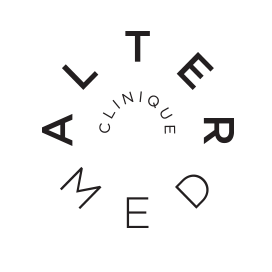Clinique Altermed
Already tired and frustrated with your resolutions to change your eating?
Learn why traditional intentions to change our eating backfire and what to do instead.
For many people, ringing in the New Year provokes intentions to live a healthier life and often we look to food for this transformation.
Unfortunately, many of our popular beliefs about food and health are deeply flawed and can actually result in poorer health. Imagine that – the very things we turn to to feel in control of our health and wellbeing, can lead us in the opposite direction we desire. This is a rare occurrence in our general lives, but in the world of diet, wellness and weight loss, this opposite reaction is overwhelmingly common.
Here are a few myths about food and health that can lead your health in the wrong direction
Myth: weight loss will improve our health.
Our health is complicated and complex. There are MANY factors that have an impact on our health and weight is only one, small influence. It is not even the biggest influence over our health and yet we have been told for decades that our weight must be controlled to have any hope for health. The science says otherwise.
There are things we can somewhat control that impact our wellbeing, like food, movement and sleep. And there are many more factors that we cannot control that have a huge impact such as genetics, socioeconomic status, stigma, discrimination and oppression, access to healthcare, the city we live in, food access, and many more.
It is a normal human desire to be in control of our health but wanting to control it and actually controlling it are two different things.
Focusing all our desires to change food and movement routines in order to change our weight is actually missing a really important fact that these things will influence our health regardless of weight change.
Meaning, if you decide to eat more fruit or take a walk at lunch, these things will improve your health, whether you lose weight or not. Hinging these changes on lowering the number on the scale is not helpful and it is not a measure of any health improvement. Not to mention the frustration that comes along with expecting to see a change in the scale with all your hard work.
Myth: we can control our weight (if we really wanted to)
We discussed above about how weight loss doesn’t guarantee health improvement. What about wanting to lose weight for reasons other than health?
There is nothing wrong with wanting to change your body size, in fact it is sadly very common to want to for many complicated reasons (that have nothing to do with vanity). No matter the reason (for health or otherwise) the frustrating truth is that we do not have ultimate control over our size. Genetics, medications, dieting history, gut flora, our jobs, our responsibilities, our human limits all play a big factor (among other things) in determining our natural, healthy weight. BMI has nothing to do with your natural healthy weight- it cannot be calculated.
As I mentioned earlier, it is normal to want to control things and realizing that we cannot control our weight can feel devastating. However, there is ANOTHER WAY to feel empowered about your wellness, another way to feel more comfortable in your body and another way to feel in charge of your eating.
Weight loss brings us none of those things in the long run. Focusing on weight loss to improve body image or feel more in control of food eventually backfires for most every human.
Believing we can and that we should control our weight leads to blame and shame. It does nothing to lower your weight or the population’s collective weight and leads to poorer health.
After decades of weight loss research, we still don’t have any answers for long term weight change. The good news is that we don’t need to lose weight to be healthy or feel better about our body. There are other health enhancing, body image improving methods that work well.
Myth: food is medicine and must be monitored closely to avoid making a dangerous mistake.
Food certainly contains vital nutrients for the functioning of our body. But getting what we need is not as complicated as diet culture has made it out to be. Nutrients or foods that don’t positively impact the optimal functioning of our body do not “take away” from the nutrients that are health enhancing. Meaning, eating a cookie does not take away or negate any of the nutrients we got from our morning oatmeal and blueberries.
Sure, if we eat certain nutrients in large amounts it may impact our health (such as trans fats) but they are not the only things that effect our health (example, not everyone with high cholesterol eat “too many” trans fats).
Our body has a build in system that helps us get what we need in terms of energy and nutrients. Our appetite regulatory system signals us when we need nourishment and our body naturally encourages us to enjoy all the types of foods that we have available.
If you feel you are always drawn towards certain food or fear that you “never” want foods like fruit, vegetable and whole grains (foods that have typically been labelled as healthy), then it is likely a relationship problems with food and body that you have – not a problem with your appetite regulatory system.
Blaming some inherent addiction to food or the food itself does not help us to feel calm around it or eat it in amounts that feel good.
In other words, if you find yourself eating “too much” of certain foods and not enough of others, it is not because you are a chocoholic or addicted to that food. It is more likely that your relationship with that food (or food group) has been damaged through dieting, trying to avoid it, or being told that this food is bad.
Myth: cutting out food from your life is easy and helpful
One very, very big fact that diet culture leaves out of the conversation about food changes is that eliminating a food from your life (especially those that you enjoy) is exhausting and often
can't be carried out long term.
Unless you have a serious adverse reaction to the food (for example an anaphylactic reaction or extreme gastrointestinal discomfort), it is not easy or natural for humans to eat in a rigid way and eliminate food choices.
We are bombarded with messages daily about how cutting certain foods out of our lives is the answer for your health, wellness or weight loss. The science does NOT back this up, and lived experiences do NOT back this up.
Not to mention that rules around food eventually are broken and we blame ourselves rather than our natural desires for flexibility with food choices and need for enjoyment from food.
I am sure there is a more technical term, but I call it diet fatigue. Feeling tired, drained or exhausted at the thought of having to cut certain foods out of your life is a normal reaction to food rules. Sure, they can feel comforting and easy at first but over time our need for satisfaction and variety of food kicks in- it is a mix of our biology and psychology- not a failing on your part. Humans cannot stick to rigid food rules or plans for long before burning out.
Hyperfocusing on what we eat and constantly monitoring our food and constantly trying to avoid the wrong foods is exhausting and unnecessary for health.
What to do instead
If you feel pulled towards dieting or a lifestyle plan that includes rules around what to eat and how much to eat, consider the facts that weight loss isn’t needed to improve your health, controlling our weight isn’t your life’s work, food is not poison and being rigid with food choice is not a natural thing for humans to do. Not to mention how detrimental all these things are to our health.
If you are feeling like dieting or controlling your weight and eating hasn't worked for you in the past and the idea of jumping on board with more of these kinds of resolutions, there is ANOTHER way.
Intuitive eating improves our health and wellbeing and empowers us to live a life that is calm with food and helps to repair our relationship with our body image.
If you'd like to learn more about intuitive eating and how it can empower you, reach out to me,


